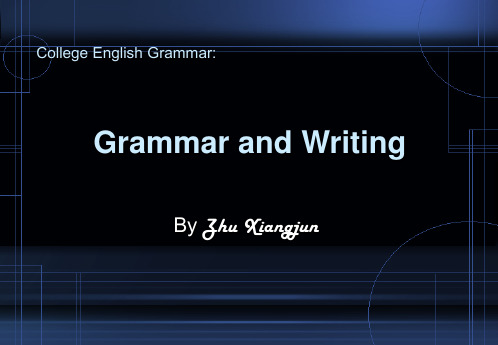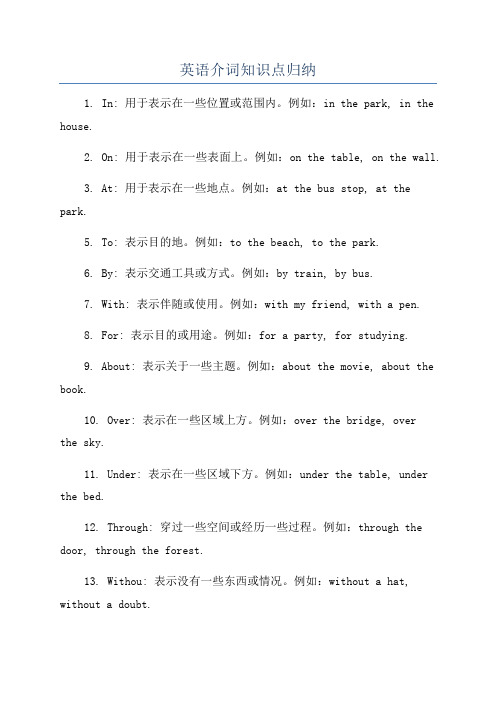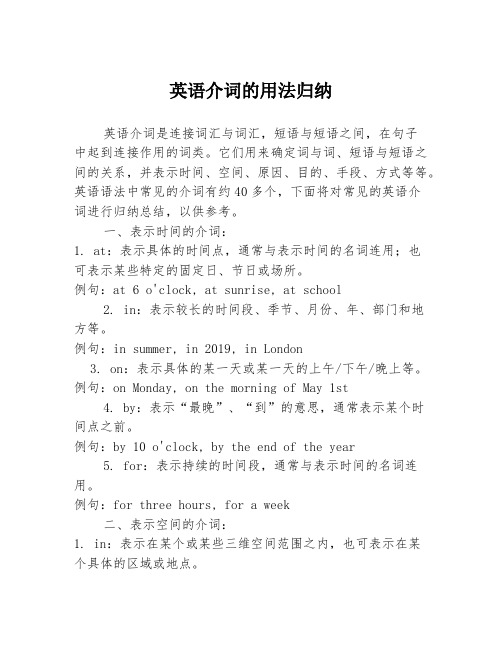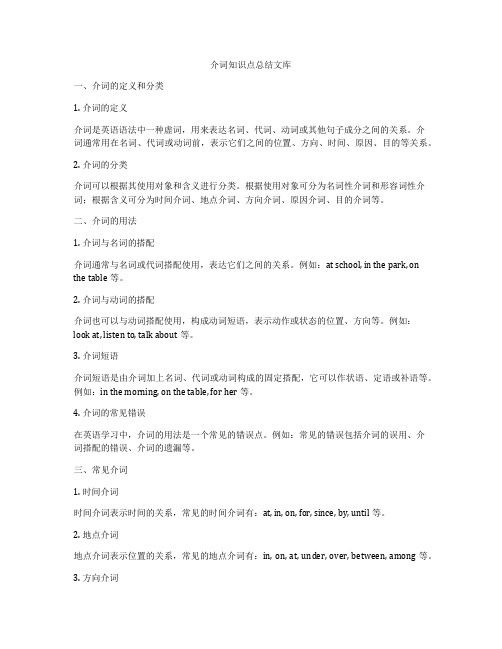大学英语语法-介词
大学英语语法总结(全面)

大学英语语法总结(全面)大学英语语法总结(全面完整版)1. 介词(Prepositions)- 表示地点:at, in, on- 表示时间:at, in, on- 表示方式:by, with- 表示原因:because of, due to- 表示目的:for, to2. 冠词(Articles)- 定冠词:the- 不定冠词:a, an3. 代词(Pronouns)- 主格代词:I, you, he, she, it, we, they- 宾格代词:me, you, him, her, it, us, them- 所有格代词:my, your, his, her, its, our, their- 反身代词:myself, yourself, himself, herself, itself, ourselves, themselves4. 名词(Nouns)- 单数名词:book, chair, dog- 复数名词:books, chairs, dogs- 不可数名词:water, money, information5. 动词(Verbs)- 一般现在时:I walk, you walk, he/she/it walks, we walk, they walk- 一般过去时:I walked, you walked, he/she/it walked, we walked, they walked- 现在进行时:I am walking, you are walking, he/she/it is walking, we are walking, they are walking- 过去进行时:I was walking, you were walking, he/she/it was walking, we were walking, they were walking- 一般将来时:I will walk, you will walk, he/she/it will walk, we will walk, they will walk6. 形容词(Adjectives)- 描述名词特征:big, small, tall- 比较级:bigger, smaller, taller- 最高级:biggest, smallest, tallest7. 副词(Adverbs)- 表示方式:quickly, slowly- 表示程度:very, extremely- 表示时间:now, yesterday8. 连词(Conjunctions)- 表并列:and, or- 表递进:furthermore, moreover- 表转折:however, but- 表原因:because, since以上是大学英语语法的简要总结,希望对你有帮助。
英语语法 介词

英语语法介词介词是虚词,介词不能单独作句子成分,只能用在名词、代词或作用相当于名词的其他词、词组或从句之前,与之一起构成介词短语充当句子成分。
介词在英语中用得极为广泛、灵活,可组成许多成语和习惯用法,因此学习时要特别注意。
1.介词的种类(1)简单介词on,in,with,by,for,about等(2)合成介词into,out of,as for,without(3)短语介词by means of,because of,according to,in respect of,in contrast with,in spite of(4)分词介词including,concerning,considering,regarding,provided,given2.介词短语介词短语是由介词和构成介词短语的那部分名词或相当于名词的其他词或短语构成的。
主要有下列几种:(1)介词+名词Aluminum and zinc can easily combine with the oxygen in the air. 铝和锌很容易与空气,户的氧化合。
(2)介词+代词How much luggage can I take with me?我能带多少行李?(3)介词+动名词You learn to speak English by speaking it. 你用说英语这种方式来学说英语。
(4)介词+数词Everything divides into two. 事物都是一分为二的。
(5)介词+另一个介词短语The air was removed from between the two pipes. 空气已从两管之间抽出。
(6)介词+形容词或副词It is far from satisfactory.We have made some progress,but it is far from enough.我们已经取得了一些进步,但还远远不够。
大学英语语法7——介词短语

• “Coming!" Away she skimmed over the lawn, up the path, up the steps, across the veranda, and into the porch.
1. Form A prepositional phrase=a preposition+(adjectives)+a noun/pronoun
• I often consulted the adviser. • During my study period, I often consulted the adviser about
my selective courses.
2. Functions Prepositional phrases have three formal functions in sentences. They can act as an adjective modifying a noun, as an adverb modifying a verb, or as a nominal when used in conjunction with the verb form to be.
介词的种类与用法

介词的种类与用法介词是英语语法中的一种重要词类,它具有连接作用,在句子中常用来表达位置、时间、方式、原因等关系。
正确使用介词不仅可以使语句更加准确和流畅,还能让我们的表达更加具有逻辑性和准确性。
本文将介绍关于介词的种类与用法。
一、介词的定义与特点介词是一种虚词,它的主要特点是和名词、代词或名词性短语搭配使用,构成介词短语。
介词短语在句子中常作状语、定语或补语等成分。
二、介词的基本种类1. 表示位置关系的介词in、on、at、under、above、below等介词常用来表示物体的位置关系。
例如:- The book is on the table.(书在桌子上。
)- The cat is under the chair.(猫在椅子下面。
)2. 表示时间关系的介词in、on、at、before、after等介词常用来表示时间的前后顺序以及具体时间点。
例如:- I will go shopping in the morning.(我上午去购物。
)- They arrived at the airport on time.(他们准时到达机场。
)3. 表示方式关系的介词by、with、like、as等介词常用来表示行为方式或者比较对象。
例如:- She drew a picture with a pencil.(她用铅笔画了一幅画。
)- He speaks English like a native speaker.(他讲英语像个母语者。
)4. 表示原因关系的介词because of、due to等介词常用来表示某个事物的原因。
例如:- The match was cancelled due to heavy rain.(比赛因为大雨被取消。
)- He failed the exam because of laziness.(他因为懒惰而考试不及格。
)三、介词的常用搭配与固定搭配介词搭配是介词的重要用法之一,掌握了常用的介词搭配能够提高语言表达的准确性。
英语介词知识点归纳

英语介词知识点归纳1. In: 用于表示在一些位置或范围内。
例如:in the park, in the house.2. On: 用于表示在一些表面上。
例如:on the table, on the wall.3. At: 用于表示在一些地点。
例如:at the bus stop, at the park.5. To: 表示目的地。
例如:to the beach, to the park.6. By: 表示交通工具或方式。
例如:by train, by bus.7. With: 表示伴随或使用。
例如:with my friend, with a pen.8. For: 表示目的或用途。
例如:for a party, for studying.9. About: 表示关于一些主题。
例如:about the movie, about the book.10. Over: 表示在一些区域上方。
例如:over the bridge, overthe sky.11. Under: 表示在一些区域下方。
例如:under the table, under the bed.12. Through: 穿过一些空间或经历一些过程。
例如:through the door, through the forest.13. Withou: 表示没有一些东西或情况。
例如:without a hat, without a doubt.14. Above: 表示在物之上。
例如:above the clouds, above the sign.15. Below: 表示在物之下。
例如:below the surface, below the line.。
介词连词知识点总结归纳

介词连词知识点总结归纳一、介词的基本概念介词(Prepositions)是一种词类,它通常用来连接名词、代词、动名词或从句等成分,表示时间、地点、方向、原因、目的等关系。
英语中常见的介词有:on, in, at, to, for, with, by, from, into, out of, between, among, through等。
1. 表示时间关系的介词on:表示某一天、日期、时间点等。
in:表示较长的时间段,季节、年代等。
at:表示具体的时间点、场所、节日等。
例句:I will meet you at the corner of the street at 3 o'clock.I was born in 1990.She always goes to school on foot.2. 表示地点关系的介词in:表示某个大的范围或容器内。
on:表示某个平面或表面上。
at:表示某个具体点或目标。
例句:The book is in the drawer.There is a cat on the roof.She is waiting at the bus stop.3. 表示方向关系的介词to:表示朝着某个目标或方向。
from:表示从某个地点或方向出发。
into:表示朝着某个范围或内部。
例句:He walked to the park.I come from China.She poured the water into the glass.4. 表示原因和目的的介词for:表示给予或用于某种目的。
with:表示陪伴或使用某种手段。
例句:I bought a gift for my friend.She cut the cake with a knife.5. 表示关系的介词between:表示在两者或多者之间的关系。
among:表示在多个之中的关系。
through:表示穿过或通过某个范围。
英语介词的用法归纳

英语介词的用法归纳英语介词是连接词汇与词汇,短语与短语之间,在句子中起到连接作用的词类。
它们用来确定词与词、短语与短语之间的关系,并表示时间、空间、原因、目的、手段、方式等等。
英语语法中常见的介词有约40多个,下面将对常见的英语介词进行归纳总结,以供参考。
一、表示时间的介词:1. at:表示具体的时间点,通常与表示时间的名词连用;也可表示某些特定的固定日、节日或场所。
例句:at 6 o'clock, at sunrise, at school2. in:表示较长的时间段、季节、月份、年、部门和地方等。
例句:in summer, in 2019, in London3. on:表示具体的某一天或某一天的上午/下午/晚上等。
例句:on Monday, on the morning of May 1st4. by:表示“最晚”、“到”的意思,通常表示某个时间点之前。
例句:by 10 o'clock, by the end of the year5. for:表示持续的时间段,通常与表示时间的名词连用。
例句:for three hours, for a week二、表示空间的介词:1. in:表示在某个或某些三维空间范围之内,也可表示在某个具体的区域或地点。
例句:in the room, in the park2. on:表示在某个平面面上,通常用来表示地点。
例句:on the table, on the wall3. at:表示在某个具体的地点或位置。
例句:at the door, at the bus stop4. by:表示“靠近”、“经过”等含义。
例句:by the river, by the window5. between:表示在两个或两个以上的物体或位置之间。
例句:between two mountains, between the buildings6. among:表示在三个或三个以上的物体或位置之间。
介词知识点总结文库

介词知识点总结文库一、介词的定义和分类1. 介词的定义介词是英语语法中一种虚词,用来表达名词、代词、动词或其他句子成分之间的关系。
介词通常用在名词、代词或动词前,表示它们之间的位置、方向、时间、原因、目的等关系。
2. 介词的分类介词可以根据其使用对象和含义进行分类。
根据使用对象可分为名词性介词和形容词性介词;根据含义可分为时间介词、地点介词、方向介词、原因介词、目的介词等。
二、介词的用法1. 介词与名词的搭配介词通常与名词或代词搭配使用,表达它们之间的关系。
例如:at school, in the park, on the table等。
2. 介词与动词的搭配介词也可以与动词搭配使用,构成动词短语,表示动作或状态的位置、方向等。
例如:look at, listen to, talk about等。
3. 介词短语介词短语是由介词加上名词、代词或动词构成的固定搭配,它可以作状语、定语或补语等。
例如:in the morning, on the table, for her等。
4. 介词的常见错误在英语学习中,介词的用法是一个常见的错误点。
例如:常见的错误包括介词的误用、介词搭配的错误、介词的遗漏等。
三、常见介词1. 时间介词时间介词表示时间的关系,常见的时间介词有:at, in, on, for, since, by, until等。
2. 地点介词地点介词表示位置的关系,常见的地点介词有:in, on, at, under, over, between, among等。
3. 方向介词方向介词表示方向的关系,常见的方向介词有:to, from, into, out of, through, across等。
4. 原因介词原因介词表示原因的关系,常见的原因介词有:because of, due to, owing to等。
5. 目的介词目的介词表示目的的关系,常见的目的介词有:for, to, in order to, so as to等。
- 1、下载文档前请自行甄别文档内容的完整性,平台不提供额外的编辑、内容补充、找答案等附加服务。
- 2、"仅部分预览"的文档,不可在线预览部分如存在完整性等问题,可反馈申请退款(可完整预览的文档不适用该条件!)。
- 3、如文档侵犯您的权益,请联系客服反馈,我们会尽快为您处理(人工客服工作时间:9:00-18:30)。
angry,bad, clever, disappointed,good, quick, skillful, useless, weak
for
ambitious, available, enough, fit,grateful, hungry,necessary,noted,ready, sorry, responsible, suitable, useless
I knew himfroma boy.我从孩提时就认识他了。
They discussed the matterafterlunch.他们午饭后讨论了那个问题。
3
to, before, by, till /until
均可表示情况的终止时间。to“到”:表示终止时间,与from相对;before“在……以前,直到……前”;by“最迟在…之前”。till/until“直到”:与表示持续性动作的动词连用,表示某件事持续到某时为止。
2
since, from, after
since表示“自从…(到现在)”:与现在完成时连用表示时间的继续,也可与过去完成时连用表示过去终止的情况的起点;from“自……起”,表示起始时间,与to相对;after “自……后”:表示时间先后的顺序
He has lived in Beijingsince1990.他1990年以来一直住在北京。
He has worked in the companyforthree years.他在这家公司工作三年了。
It is coldduringthe winter.冬天天冷。
The rain lastedthroughthe night.雨下了一整夜。
The scientist worked in the labthroughoutthe night.那个科学家通宵在实验室工作。
on
dependent, hard, keen, intent
to
acceptable, agreeable, attentive, attributable,blind, comparable,convenient,courteous, deaf, destructive, essential,faithful, favorable,grateful, helpful,hostile,indifferent, immune, inferior, liable, preferable, relevant,related, repugnant, responsible,useful, similar, superior, sensitive, suitable, unjust
动词+宾语+介词
make a fool of, put an end to, take delight in, attach importance to, pay attention to, take interest in, catch hold of, catch sight of, have an advantage over, wash one’s hands of, keep an eye on, lay emphasis on, lose sight of, make a fuss over, make a mess of, make fun of, make room for, make use of, play a joke on, , take advantage of, take pride in, take the place of,
与名词的搭配
有些名词后有固定பைடு நூலகம்介词搭配,
He found asolution tothe problem.他找到了解决问题的方法。
There is no realdifference betweenthe two proposals.这两个提议没有实质上的区别。
有些名词前有固定的介词搭配,
You should beon guardagainst bad company.你应该提防交错朋友。
in
belief, confidence, curiosity, delight, experience, failure, faith, interest, hesitation, involvement, mistake, progress, result, skill, success
of
capacity, capability, command, dislike, expectation, grasp, guilty, habit, honor, horror, impression, prevention, pride, purpose, view
2.表示地点和位置的介词(短语)
介词
辨析
例句
1
at, in, on
at表示位于较狭窄的地点;in表示位于较宽广的地点。on意为“在……上”,表示某物和另一物表面相接触
I will meet youatthestation.我去车站接你。
They liveinthe suburbs.他们住在郊区。
for
ambition, award, care, change, consideration, cure, demand, desire, excuse, opportunity, penalty, pity, regret, reputation, request, respect,reward, search, shame, sympathy, talent
How long is ittodinner?到晚饭时间还多久?
He woke upbefore5.他不到5点就醒了。
You must be therebysix.你必须6点前赶到那里。
We will stay hereuntiltomorrow.我们将在这里呆到明天。
4
in,
within
in “再过……时间,花费……时间”;within“在……时间以内”
He was exceedinglyfond offishing.他特别喜欢钓鱼。
Drivers exceeding the speed limit areliable toa fine.超速行驶的司机易被罚款。
The man isblind ofan eye.那个男人瞎了一只眼。
Jackwas blindtohis own fault.杰克没觉察到他自己的过失。
其他
shelter from, advantage over, control over/of, contact with, connection with,entrance into
常见的介词与动词的搭配
动词+介词
ask for, ask about,attend to, bed for, believe in, beware of, comply with, conform to, consist of, deal in, deal with, depend on, dream of, insist on, persist in, long for, object to, prepare for, refer to, rely on, resort to, succeed in, wait fo
with
angry,awkward, blue, bored,content,careful, disappointed,familiar, friendly, happy,identical, popular,polite, uneasygenerous,
常见的介词与名词的搭配
between
difference, distinction, gap, link, relation
Histrainleavesinan hour.他乘坐的火车一小时后开。
He will be backwithinan hour.他过不了一小时就回来。
5
for, during, through, throughout
均可表示时间段。for“历时”:与表示持续性动作的动词连用,表示某事持续发生时间的长短;during表示“在……期间”;through表示“整个……时间,从开始到结束无间断”,throughout语气更强
from
absent, different, free, remote, exempt,inseparable, safe, tired
in
interested, rich, slow, successful,deficient, expert, quick, successful, weak
of
afraid, aware, capable, careful, careless, conscious, critical, fond, full, independent, jealous, proud, short, sure, suspicious, thoughtfulcharacteristic, critical, envious, , impatient, independent, jealous, positive, scared, sensible, short, sick, suspicious, typical, worthy
动词+宾语+副词+介词
Pleaseput the coat down tomy account.请把买大衣的钱记在我的帐上。
2.常见的与介词有搭配关系的词
类别
介词
与介词搭配的例词
常见的介词与形容词的搭配
about
anxious, careful, careless, certain,curious, enthusiastic, guilty,happy, mad,particular, sensitive,sure,worried
